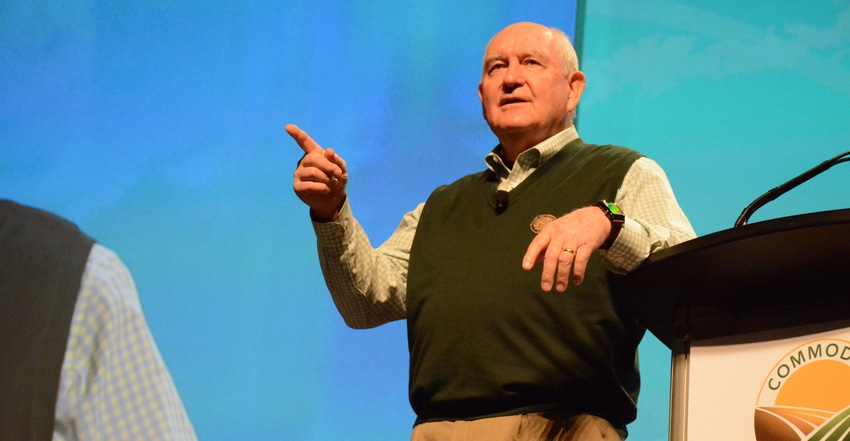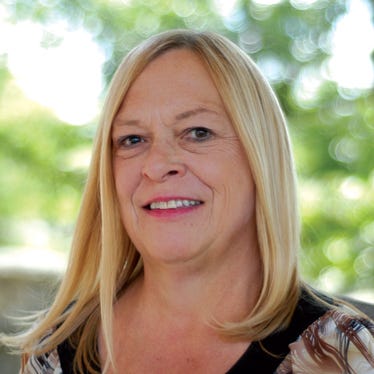
In answering questions from the media, U.S. Secretary of Agriculture Sonny Perdue offered hope for good outcomes but stopped short of promising results in the short term at the Commodity Classic in Orlando on Friday.
He was upbeat on current trade negotiations but acknowledged there is still a long way to go to get goods moving to a wide range of countries that are not currently in the spotlight, including Japan, Indonesia, Vietnam, South Korea, the Philippines and more.
Concern about ‘fear of food’ trend
Perdue made it clear that a major point of concern for him is what he sees as a rising tide of “marketing by insinuation” that creates a “fear of food.”
He said he wants to see a set of rules that allows any producer to market the positives of their own product without allowing them to denigrate the products of others.
“I am already concerned about cell-based protein being called ‘clean meat’,” he said. “I think you can talk about your product in positive terms without calling others wrong, inhumane, unsafe or whatever.”
The Secretary stressed that he believes all food produced by U.S. farmers is clean and healthy and it is important for consumers to understand that.
“I’ve watched us get into this GMO issue,” he said. “I knew it had gone too far when I saw labels for “Non-GMO shampoo.”
Addressing steel, aluminum tariffs
Perdue said he had assumed that the tariffs on steel and aluminum from Canada and Mexico would be lifted with the signing of the U.S.-Mexico-Canada Agreement and confessed he surprised when they weren’t.
Perdue said he understands that President Donald Trump believes in the power of tariffs as leverage in negotiation.
“I believe he has validated that leverage,” Perdue said. “But I’d like to convince him that there comes a time when the leverage has been applied and it worked and now it’s time to ease back.”
The secretary said he can’t offer a timeline for when the tariffs, which have been a stumbling block especially for Canada and are not popular with American manufacturers who have seen their cost of production increase for everything from farm machinery and automobiles to beverage cans.
Perdue said he is somewhat “out of my lane” in discussing those tariffs and said he can “offer no timeline” on when they might be lifted.
On the plight of younger farmers
Perdue said he is well aware that farmers are hurting under the current trade situation and that younger farmers, many of whom made the decision to leave other careers and return to the farm during the ‘boom times’ from 2008 to 2013, are especially vulnerable because they don’t have the benefit of built-up equity enjoyed by older farmers who had the chance to pay off debt and accumulate savings during the good years.
“I realize that they are in peril and we do have programs through FSA that can offer them some loan guarantees and so forth but there’s no silver bullet. They have to hang in there and hang tough and tie another knot in the rope and hang on,” he said. “They have the assurance of knowing that their parents and grandparents weathered times like these, too.”
On a timeline for recovery
Perdue offered assurances that, while promises of soybean purchases has captured a bulk of the attention during talks of restoring trade with China, the actual negotiations are not ignoring the reality that there is a broad array of commodities that could benefit from broadening trade.
“The talks are not ignoring rice, beef, ethanol, DDGs, sorghum and cotton,” he said. “We are hopeful that we will see bigger purchases of many American ag products as we move forward with an agreement.”
He said however that it’s ‘not over until it’s over’ and that he could not offer a timeframe for when ag producers, who have already seen enormous losses, might be made whole.
He did say however that the thing he wants most to see during his tenure in Washington is a “magnificent conclusion” to the China negotiations.
He also said that while the negotiations are offering hope for much greater sales of American goods into China that the real issue will be enforcement of any agreement and building a path to make those promises turn into actual purchases.
Help for dairy coming soon
Perdue told the media that he had hoped that new dairy program sign-ups could begin on Dec 21, one day after the 2018 Farm Bill was signed.
He said he soon learned, however, that in federal programs, a law isn’t just a law and there are very complex rules that have to be written and regulations put in place in implementing a new law.
“There has to be some very granular definitions,” he said. “Those are being done. We are very aware that dairy has suffered the most under the current law and we want to get help to them. I think they are going to do very well going forward. My word to them is hang on into March, April and May. Help is coming soon.”
Promises on infrastructure
Perdue said he gets the sense that everybody is in favor of infrastructure repairs and improvements and the president continues to talk about regularly.
“The thing is nobody opposes it and everybody wants it but nobody is doing anything about it,” he said.
He said that he considers rural broadband to be a major piece of infrastructure and believes that progress will be made on that front because it is so critical to precision agriculture, telemedicine, higher education and population recruitment.
He added that he thinks there is strong awareness that the U.S. has logistical advantages in our waterways and existing railroads and highways and that it is essential to maintain that advantage.
“We can’t let those go away,” he said. “We need to maintain the advantage we have.”
About the Author(s)
You May Also Like






